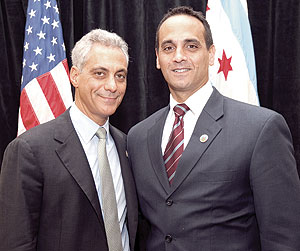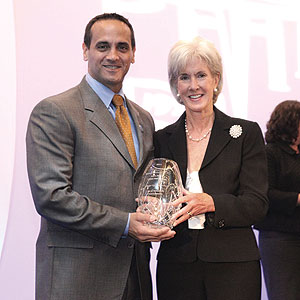
Meeting of the mayors. Joseph Curtatone of Somerville with Rahm Emanuel of Chicago.
By Andrew Firestone
In a city in need of federal funds, sensible economic development policy and creative ideas for fostering businesses, leadership sometimes needs good ideas and conversation to find the way forward.
Mayor Joseph Curtatone of Somerville had a busy week ending October, travelling to Chicago Illinois, Washington D.C. and Virginia in a tour-de-force of public policy discussion. In his trip he met with such luminaries as Secretary of Health Kathleen Sebelius, Mayor Rahm Emanuel of Chicago, First Lady Michelle Obama, and President Barack Obama and his staff. Discussing a host of issues, including public health, public policy and economic development, Curtatone called the trip a “great experience.”
“Somerville is once again being recognized as a national leader on childhood obesity prevention and community wellness,” said Curtatone. In Alexandria Virginia, the mayor presented the renowned “Shape-up Somerville” and received an award from the Department of Health and Human Services for Healthy Living Innovations after the city’s “Shape-up Somerville” program was recognized for influencing First Lady Obama’s “Let’s Move!” program to combat childhood obesity.
“Healthy communities are happy communities are more productive communities,” said Curtatone.
“This is not about losing weight. This is about changing how we live. It’s about social change. But it’s about changing the systems, and developing policies that create systems and opportunities that make us want to behave in a particular way,” he said, relating the ill-effects of childhood obesity on society.

Mayor Joseph Curtatone met with many prominent officials during his whirwind tour, including Secretary of Health Kathleen Sebelius, pictured here.
“People shouldn’t have the misconception that we’re trying to tell people how to act and how to live. It’s not our responsibility. But we have a responsibility, where for a decade governments have developed policies that negatively impact our health, social well-being and quality of life, to reverse those systems,” he said.
After meeting with the First Lady, Curtatone also met with Mayor Rahm Emanuel at the Chicago summit, along with members of the National League of Cities a group of municipal leaders from around the country, where the Mayor sits on the advisory board. He related that the two talked of Rep. Mike Capuano, D – Somerville, whom Curtatone said had always spoke highly of Emmanuel. Emmanuel also spoke with admiration for Curtatone.
Curtatone, along with the NLC Advisory Board, went on to Washington to hear President Obama discuss issues surrounding transportation, infrastructure and immigration, as well as the American Jobs Act. Curtatone then discussed these issues with Transportation Secy. Ray LaHood, and Housing and Urban Development Secy. Shaun Donovan. He asked the first question, regarding the federal government’s commitment to transit-orient development.
“Infrastructure investments have always been supported by both parties,” said Curtatone. “If we really want to turn this country around, if we really want a sustained economic recovery and create jobs and create tax revenues, we need to invest in infrastructure right now in a down economy.”
Curtatone was quick to note that, in the proposed Jobs Act carried with it a similar funding program to that of the DIF (District Improvement Financing) bond, which helps support development by reinvesting tax revenues into infrastructure. The American Jobs which failed to pass through the Senate on November 4 due to conflicting bills along party lines would have included a .7 percent increase taxes for those earning over $1 million a year. The cost of the program would have been $60 billion, focused on transportation infrastructure improvements. It was defeated 51-49 in the Senate.
Curtatone held a press conference in Assembly Square that day, and called on Senator Scott Brown to cross the aisle and sign the act. During his meetings with NLC, Assembly Square was highlighted as a model for public-private partnership, due to its overarching encouragement of working with government organizations and private developers in foster growth and jobs.
Brown supported a competing bill that would not raise taxes, and commented that he would not vote on a bill that included raising taxes. The competing bill would have extended funding for highways and transit, but not gone as far as investing $50 billion in infrastructure nationwide and $10 billion for an infrastructure bank. It would have curbed regulations geared towards environmental health.
“Raising taxes will hurt the economy,” said Brown. “So, today I voted for a bill that finances infrastructure improvements with unspent federal funds, instead of taking more money out of the economy and sending those dollars to Washington. I join with those who want to see more jobs and improvements to our transportation infrastructure. I share their frustration at the lack of progress in Washington.”
“That’s just not true,” said Curtatone on Brown’s comment on raising taxes.
“That broad brush that we paint for a small incremental increase on the richest one percent in this country, to be dismissive about it is a very partisan position,” said Curtatone.
The mayor said that one thing that struck him in his discussion with the NLC and the many other mayors he met, including Stephanie Rawlings-Blake of Baltimore, MD and Willis “Chip” Johnson of Hernando, MS, was that the partisan struggles that have stagnated Congress at a federal level have no place in their discussion.
“I expected to get a really political, partisan reaction to discussion around the Jobs Act,” he said, “but what stood out to me was the unified reaction to the inability of Washington and Congress to get things done.”
In discussing policy, Curtatone said that he was struck by how cohesive and united the municipal leaders were, despite political party differences.
“Municipal leaders are a very close collegial group around this country. Party politics does not come into our thinking. What we want, what America wants is results. We want Washington to govern, we want our leaders in Washington to work together to get results, not to work for their own political parties.”
“Whether you’re in Massachusetts, Mississippi, Montana, California, Illinois or Florida, we have the same challenges,” he said. “It helps us to protect our core services, which helps us improve the quality of life in our cities and towns and we are, in all in cases, the economic fuel for our states’ economy. Deeper cuts to our municipalities around the country will only prolong stagnation and the recession, and we need to climb out of it.”
In facilitating further development for the city, Curtatone recently formed the Future Economies Commission, a group of senior city staff and business leaders from around the region to advise the Mayor in his plans for bringing more high-tech industry to the city, and entice emerging markets to the city.
“I submit that Somerville can reap and will reap the benefits of our planning; the major infrastructure investment going on now, that’s coming in the future, and our comprehensive Somervision process, our vision to attract the expansion of biotech and high-tech industries of Kendell Square as they think of the migration of their growing companies,” he said. He said he hoped to make Somerville a “home to the next generation of those industries.”
Curtatone said that public works bills that create infrastructure and jobs are necessary to facilitating this change. He was critical of Congress, a sentiment he said was shared by many in the NLC, for their inability to “solve real problems.”
“Obviously to [Republican lawmakers], creating jobs, getting this country back to work, growing our economy, helping working class families, helping municipalities provide the core services and improve our education systems, that’s taken a back seat to them wanting to defeat the president politically,” he said. “So, who are they representing?”
He added that he hoped that the nation would elect more leaders to Congress that “have an orienting value, an overarching purpose of moving this country forward.”
Curtatone said that his meeting with the First Lady was encouraging, and called her a “very warm and engaging person, and genuine as well.” He said he hoped the next time they met would be in Somerville, 2009 All-American City.
Of the President, whom the mayor met briefly, he said that he always asks about his old hometown, where Obama lived during his time at Harvard Law School.
“Somerville was really good to me while I was there,” Curtatone relates Obama saying. “Say hello to my hometown.”












Reader Comments